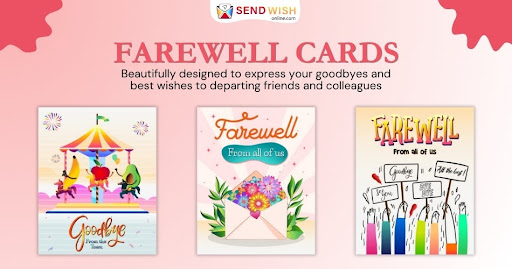In an era dominated by quick digital goodbyes and impersonal emojis, an unexpected trend is reemerging: the revival of farewell cards in professional environments. Though email has become the default for communication, a thoughtful, handwritten Goodbye Cards is making a strong comeback, resonating both with departing employees and the colleagues they leave behind. So, why is this seemingly old-fashioned tradition returning?
More Than Just an Email Goodbye
Let’s be honest: the typical “Best of luck!” Email often feels cold and insincere. In a world overloaded with digital messages, a handwritten card breaks through the noise. Writing a card takes time and effort, showing a sincere desire to offer gratitude and well wishes. The act of putting pen to paper adds a personal touch, providing warmth and authenticity that is often lacking in emails.
Fostering Deeper Connections
Farewell cards offer a way to share more personal thoughts and emotions that are usually absent from professional emails. Colleagues can reflect on specific moments, share inside jokes, or recall fond memories of working together. This kind of personal sentiment helps strengthen professional relationships and builds a sense of camaraderie within the team. For the employee leaving, receiving such messages can be a heartwarming reminder of their contributions and the impact they’ve had on their workplace.
Creating Future Opportunities
While farewell cards often mark the end of a chapter, they can also help maintain future connections. A well-thought-out message can leave a lasting impression, potentially opening doors for future collaborations or mentorship opportunities. As professionals frequently move between companies, keeping in touch with former coworkers can be highly beneficial. Farewell cards serve as a reminder of shared experiences, making it easier to reconnect down the road.
A Personal Touch in a Digital World
In a time when most interactions are virtual, people crave genuine human connection. A handwritten card is a tangible representation of that bond, offering a physical sign of appreciation. It signals that the departing colleague isn’t just another employee—they’re a valued part of the team’s shared journey. This recognition can have a meaningful impact on workplace morale and highlight the importance of human relationships at work.
Adapting Traditions for the Modern Era
Farewell cards are evolving to fit the digital age. Many online platforms now allow users to create customized cards that can be printed or even include multimedia elements like videos. This blend of traditional and modern approaches enables people to maintain the personal feel of handwritten notes while embracing the convenience of technology.
Why Goodbye Cards Are Making a Comeback
Several factors are contributing to this resurgence:
- Emotional Intelligence on the Rise: Today’s workplaces value emotional intelligence more than ever. Farewell cards offer a meaningful way to express gratitude, best wishes, and personal memories, going beyond the standard “good luck” email.
- A Desire for Genuine Connection: In a world where most interactions are fleeting, a physical card can create a lasting impression. The personal effort behind a handwritten message communicates care and thoughtfulness, qualities often missing in digital exchanges.
- Tailored and Personal: Unlike the generic nature of emails, farewell cards can be highly personalized. They can include jokes, inside references, and specific anecdotes, making the message unique and meaningful to the recipient.
- Tangible and Memorable: In a digital landscape, a physical card can be a lasting reminder of a colleague’s presence and impact. It can be displayed on desks or bulletin boards, serving as a daily reminder of positive memories and contributions.
The Benefits of Goodbye Cards
The return of farewell cards isn’t just nostalgic—it brings practical benefits for both employees and companies:
- Boosting Morale: A thoughtful farewell can leave a lasting positive impact on colleagues, fostering goodwill and appreciation within the team.
- Strengthening Bonds: Sharing personal stories and well wishes can deepen relationships between coworkers, creating a more connected and supportive workplace.
- Enhancing Company Culture: When employees feel recognized and valued, it contributes to a positive organizational culture and enhances the company’s reputation as a great place to work.
- Building Future Networks: Farewell cards can keep lines of communication open between former and current colleagues, which may lead to future collaborations or networking opportunities.
More Than Just a Piece of Paper
Ultimately, the growing popularity of farewell cards highlights the deep-rooted human need for meaningful connections and genuine farewells. In a fast-paced, often impersonal world, these handwritten tokens offer a rare moment of human interaction, leaving both the sender and the recipient with a positive, lasting impression. So, next time a colleague leaves, think about skipping the generic email and writing a card instead—it might just provide the heartfelt goodbye your team needs.
The Future of Goodbye Cards
The resurgence of farewell cards reflects a desire for more authenticity and connection in professional life. As workplaces become increasingly digital, the need for personal gestures is becoming more important. While technology certainly has its place, it’s clear that the simple act of writing a card still has the power to forge deeper connections and create lasting memories in the workplace.











